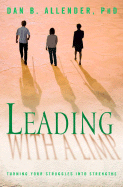Two on Leadership


In my last two postings I’ve raved about the new and wonderfully-written memoir of extraordinary preacher, writer and thinker, former Episcopal pastor, Barbara Brown Taylor. Entitled Leaving Church, it is about her life as a clergyperson, and, by book’s end, her journey out of traditional parish ministry. It is moving, funny, at times luminous in wonderfully captured vinettes, even as it tells the not uncommon story of clergy dis-ease and burnout. I found the book hard to put down (and, you must know, I put books down all day long; some I can barely stand to skim.) It is marvelous, honest, and illustrative. I hope you scroll back and read my review, if you haven’t, and maybe forward it to any pastor friends you have.
Brown tells much of her life as priest and pastor and preacher, but I do not recall her using the language of leadership. I’m reminded by the fine books on vocational holiness by Eugene Peterson that this is as it should be; there is way too much glib talk about leadership these days, and, as Peterson (and others) have written, the business model of being a corporate exec has too easily slipped into the consciousness of what we expect of our pastors, and what too many pastors want to be.
Having noted that the business model of leadership is not the best for pastors, and hinting that there are too many shallow or wrong-headed books on leadership, I still wonder what kind of a leader Rev. Taylor was. How might her memoir of faith and the story of her pastoral role in a small Georgia parish be understood in light of recent work being done on leadership development? You may not know it, but we have oodles of books of all sorts on leadership development, and it is an area we are interested in. I’m currently reading, in fact, the new Sharon Parks’ study of Ronald Heifetz leadership classes at Harvard…
We have gotten two brand new books on leadership in the shop recently that I want to rave about. One should be fairly well known, the other is rare. I will tell about them both, briefly, and trust that you may find them of interest. I have a hunch that while we may not have many pastors or preachers reading BookNotes, there may be a few leaders.
We are huge fans of Richard Mouw, the President of Fuller Theological Seminary, and stock all his books. He is a devout and pious gentleman, one who reads widely in the spiritual classics, but one who is happily sure-footed in his own tradition; he is one whose historic five-point Calvinism is solid (but relayed in open-minded and gentle ways; see the wonderful Calvinism at the Las Vegas Airport.) Mouw has been an advocate for social justice concerns, for a Christian worldview that relates faith to learning and culture, and he has logged his fair share of time in ecumenical study groups, interfaith dialogues and such. He gets stuff done. I say this to suggest his bone fides in putting together the first book I will mention; Dr. Mouw is undeniably a leader, and a thoughtful one.
Traditions in Leadership: How Faith Traditions Shape the Way We Lead was compiled and edited by Mouw and Eric O. Jacobsen (you know him from the new urbanist book, Sidewalks of the Kingdom, which we often promote here.) The solid hardback was published by the Max De Pree Leadership Center and is, sadly, hard to locate in ordinary stores. In it, various authors from various faith traditions describe how their particular faith perspective shapes their understanding of leadership. For instance, what is peculiar to a Jewish view of leadership? How does a Roman Catholic approach leadership questions in a way that is uniquely Catholic? How do the practices esteemed by Mennonites effect notions of leadership? It isn’t every volume that has chapters by a Mormon and a Pentecostal, a Quaker and a Lutheran, so you can imagine our thrill to see this delightful array…This not only helps us all understand some inter-faith distinctives, but goes a long way in helping explore the meaning of leadership and consider notions that are nearly uniformly agreed upon, and other notions that a quite contested.
A new book by the very popular Dan Allender offers a view of leadership that is very, very significant. His last book, you may recall, was one of our picks for last year’s Book of the Year (that one was called To Be Told: Know Your Story, Shape Your Future.) Leading With a Limp: How Our Weaknesses Shape our Leadership (published by Waterbrook) brings redemptive insights and very realistic psychological counsel to the task of leadership development, even in our brokenness. Allander is a solid, Biblical thinker, a counselor who knows the hurts of the world deeply, and a writer whose authenticity and clarity can only be called inspirational. What a fine book this is! There is a study guide, too, making it ideal for group use.
Leading With a Limp: Turning Your Sruggles Into Strengths Dan B. Allender (Waterbrook) $19.99 Workbook; $9.99.





<< Home